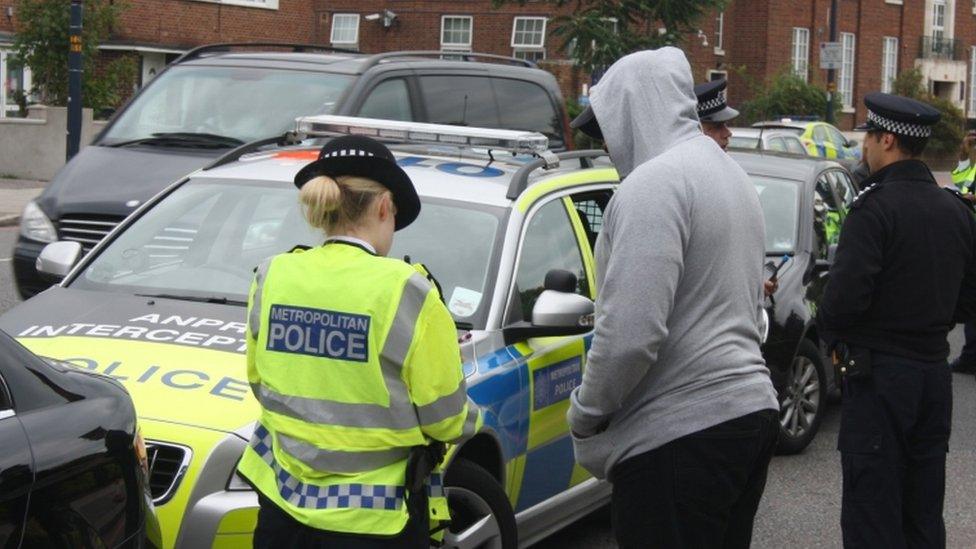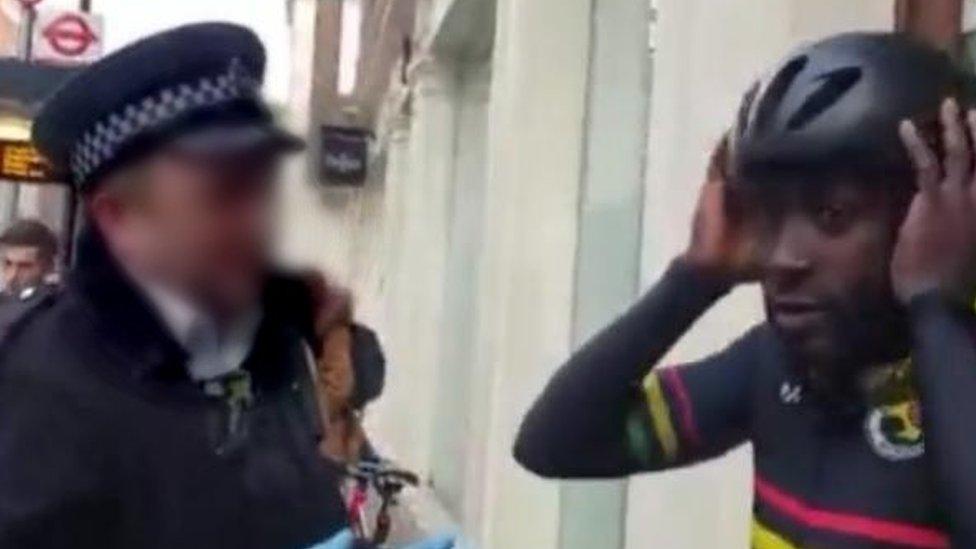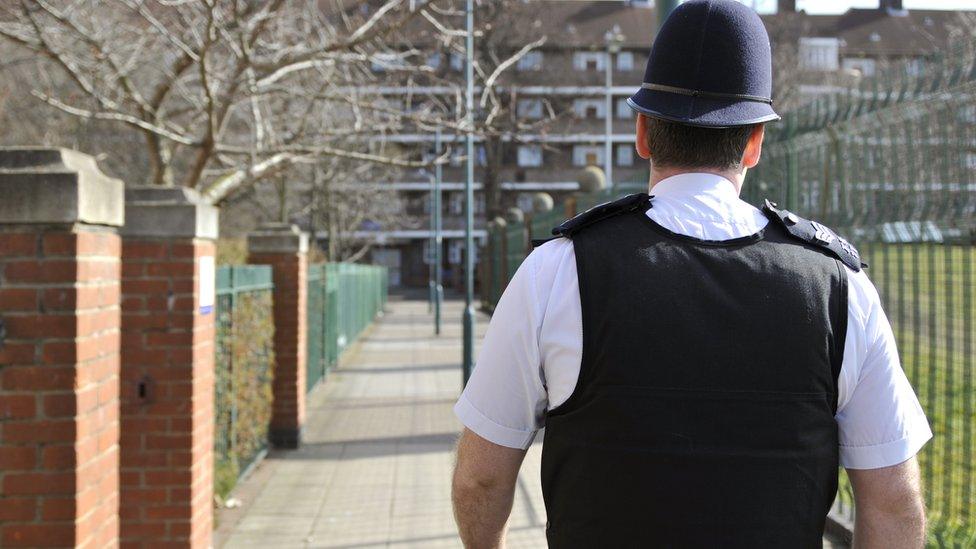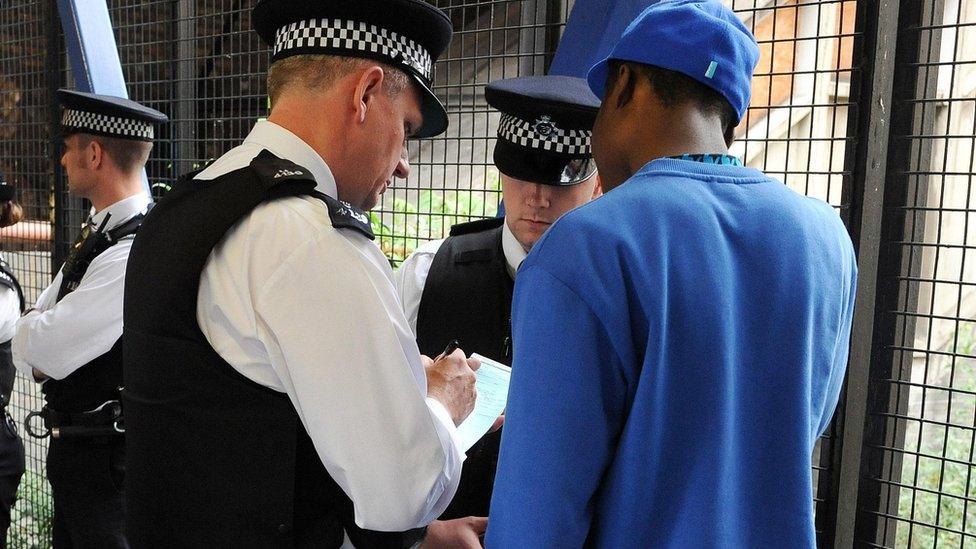Black men 'stopped and searched by Met over fist bump'
- Published

The review of the Met's use of stop-and-search powers found "much room for improvement"
Two black men were stopped and searched by Met Police officers on suspicion of exchanging drugs because they had bumped fists, a watchdog has found.
The Independent Office for Police Conduct (IOPC) reviewed the Met's use of stop-and-search powers.
IOPC director Sal Naseem said the "legitimacy of stop and searches was undermined" by a number of issues.
The Met said stop and search was a "vital and legitimate power that protects Londoners".
Latest figures show Met Police officers are nearly four times as likely to stop and search black people than white people.


In one investigation, a black man in possession of someone else's credit card was suspected of having stolen it even after providing a credible explanation, the IOPC said.
Met officers exercised stop-and search-powers on another occasion after two black men fist-bumped, as they suspected them to be exchanging drugs, the review found.
In two investigations, the alleged smell of cannabis formed the sole grounds given for a stop, according to the watchdog.

'They go on the hunt'

Mani Arthur says an officer claimed he could smell cannabis as an "excuse so he could search me"
Mani Arthur was cycling with two friends when he was stopped near Euston in November 2019, by an officer who claimed he could smell cannabis.
"It was just an excuse so he could search me," said the 35-year-old, who is one of five case studies used by the IOPC in its report.
"This is general practice.
"There are officers out there who have a certain mindset that black people are inherently criminal, so they go on the hunt."
The smell of cannabis as a single ground for stop and search is not good practice under police guidelines.
Mr Arthur was searched but no drugs were found and the IOPC upheld his complaint against the Met Police, external.
He said: "The black community have a distrust of the police.
"If they want to change the way they are viewed, they have to change the way they do community policing."

The IOPC also highlighted the failure of officers to use bodycam video from the outset and to seek further evidence after initial grounds for the stop and search proved unfounded.
Several investigations found although an initial search was negative, officers were slow in ending the encounter.
Mr Naseem said the findings "mirror concerns expressed to us by communities across London" and 11 recommendations from the review had been made and accepted by the Met.
"We saw a lack of understanding from officers about why their actions were perceived to be discriminatory," he added.

The Met said stop and search was a "vital and legitimate power that protects Londoners"
Recommendations include offering better education to officers, ensuring racial prejudice is removed and making sure any stop-and-search encounter is ended swiftly after suspicion is allayed.
Mr Naseem said: "We recommended [the Met] takes steps to ensure that assumptions, stereotypes and bias (conscious or unconscious) are not informing or affecting their officers' decision-making on stop and search.
"There is also a need to better support officers on the front line to do their jobs effectively with the right training and supervision so they aren't subjected to further complaints and investigation.
"There is clearly much room for improvement."

Analysis
Katharine Carpenter, BBC London Home Affairs correspondent
Yesterday officers in south London stopped and searched a 19-year-old in Tooting. He had a Rambo knife hidden in his trousers.
Last month the Met seized 329 weapons during similar stops. Officers will tell you that's why stop and search is such an important tool.
But it has been controversial for decades.
For many, the IOPC's findings will just confirm what they already knew.
Black men, in particular, say they are targeted unfairly because of racial bias and stereotyping.
The Met says it has already made changes.
Earlier this year Scotland Yard invited youth worker Sayce Holmes-Lewis to help deliver workshops for recruits after mobile phone footage of his stop by police went viral.
But today Mr Holmes-Lewis said he doesn't believe the current approach works.

A Met spokesman said: "We recognise that how the tactic is approached, trained and delivered remains a significant area of concern for communities across the capital and we are committed to ensuring that every encounter is conducted professionally with respect and courtesy.
"We understand the impact that even a thoroughly professional encounter can have on an individual stopped and searched, and that its impact can resonate more widely with communities."
- Published10 September 2020
- Published30 July 2020
